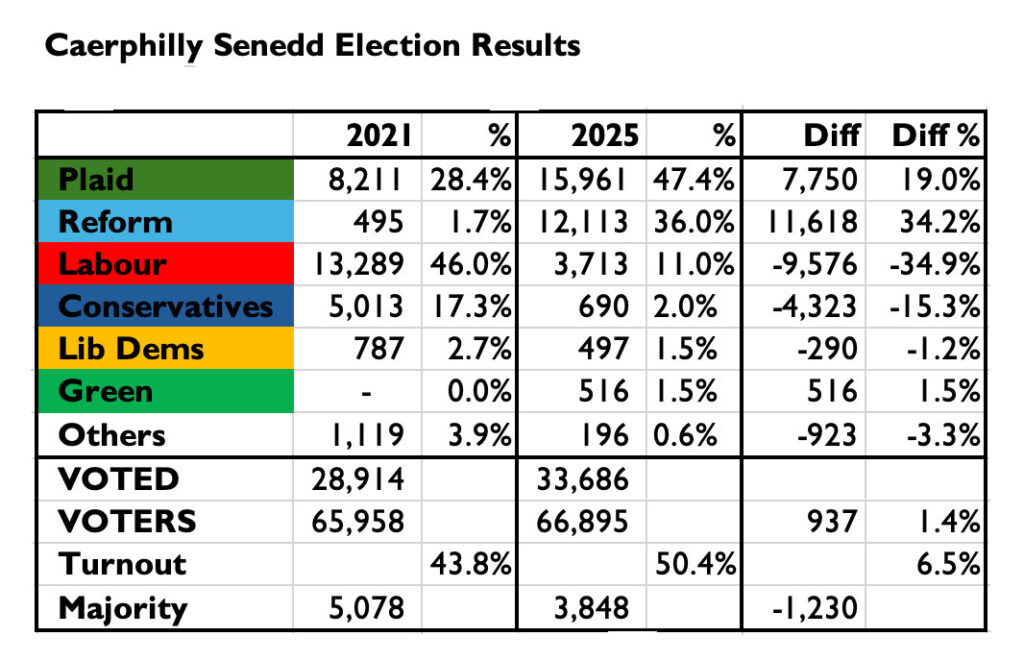Plaid Cymru’s romped home in Caerphilly
The Caerphilly by-election confirmed that political gravity is running away from the traditional Westminster parties. Plaid Cymru stormed to victory with 47% of the vote, Reform UK came second on 36% while Labour collapsed to just 11%. This is the first time since 1918 that Labour has failed to hold the seat and the first clear sign that Reform UK can now displace the Conservatives as the principal anti-Labour vehicle in broad swathes of the country (Peter Walker, Guardian, 24 October 2025.)
Dial Achos Gwenllian! It really was a moment for Welsh national pride and the 72-year old election addicted Plaid candidate Lindsay Whittle seemed as though he was both “real” and “nice” too. Labour strategists had worried about Reform’s rise, but were caught off-guard by the scale of the move to Plaid. A Labour backbencher described the result as “the loudest wake-up call imaginable.” For Plaid, the win is enormous: a vindication of regional identity politics and a sign that the two-party dominance of Westminster and Cardiff is eroding fast.
There’s been some blowback from Labour trying to accentuate the Tories’ derisory 2% showing, but the Conservatives had no hope in Caerphilly and in the traditional by-election landscape of “vote-lending” the whole question was how many votes would swing to Reform in what was likely to be a Plaid victory and how many votes would transfer on an “Anyone but Reform” basis.

Key conclusions from the Caerphilly Senedd by-election were:
– Labour can no longer rely on their traditional Welsh homeland to turn out for them.
– Resurgent nationalism in Wales reflects Scottish, Ulster/Irish and even Cornish taste for more “localism” in the face of universal cynicism about Westminster politics.
– Reform UK will face significant vote-lending between Labour, LibDems and Greens on a “Stop Reform” ticket in all upcoming elections.
Broken Britain: the escaped asylum seeker and a state losing its grip

The mistaken release of Ethiopian asylum-seeker, Hadush Kebatu, whose attempted assault of a 14-year old schoolgirl and an older woman in Epping within days of arriving illegally on a small boat, setting off the whole Bell Hotel protest in July, exposed the brittleness of Britain’s administrative machinery.
Things really just obviously don’t work any more.
The Home Office initially blamed a “data-entry error” in the prison records system, although insiders admitted that prison IT systems were “unfit for purpose” and that prison officers had become used to making release decisions on the basis of manual, local and clearly misunderstood information. (Lizzie Dearden, Independent, 25 October 2025.)
This crazy story serves as a potent symbol of the inadequacies of British administration and, for want of a better target, the lack of simple common sense amongst the staff who man the apparatus of the wildly incompetent Home Office. After years of outsourcing, IT patchwork and policy churn, the state’s ability to carry out its most basic duties – keep people safe, maintain order, process information correctly – now seems to be routinely in question.
The episode joins a growing list: lost criminal records, delayed passports, NHS data failures, uncollected bins. “Broken Britain” is no longer a slogan of opposition, it is a practical description but, importantly, one that Nigel Farage has been deploying very effectively for more than a year now.
Reform UK will use the incident to argue that the government is soft and shambolic, while Labour ministers face the impossible task of defending the machinery they have inherited but which they are now responsible for. For a public already convinced that “nothing works” this story confirms the feeling that the state cannot be trusted to manage even the mundane.
“Prince” Andrew: a sideshow with disproportionate airtime

While TM King Charles & Queen Camilla went to work at the Vatican in the name of ecumenicalism and international co-operation last week, the Dufus Prince, Andrew, dominated large swathes of British news media as Virginia Giuffre’s posthumous memoir “Nobody’s Girl” was published. The Royal Family’s attempt to contain Andrew’s continuing fall-out by requiring him to give up the use of his titles and honours (with the frustrating exception of the Princely title he was born with) proved of little effect as the “Prince’s” own bovine insistence on his innocence can not be squared with the ever-deepening litany of his venal stupidity. He really is a nasty piece of work.
Tragically while Charles and Camilla, William and Kate continue to deliver exemplary and dutiful service, Andrew’s antics open up opportunities for closet republicans and even some publications who really ought to know better to question the complicated financial settlement which is already so very weighted towards the public purse. Andrew’s deal to pay millions for the refurbishment of Royal Lodge in return for it being rented to him for a peppercorn probably made sense to the Crown Estate and the Royal Household on its own merits at the time the repairing lease was granted. Nevertheless there is a danger that the appearance of a royal wastrel living in grandeur without paying rent opens up a whole “value for money” attack line on the Royal Household, even though the complexities of the ancient Duchies and the relinquishment of the Crown Estate income already answer all sensible questions about Royal financial efficiency. Unless Andrew can be silenced and exiled there is a chance that the public will be unable to ignore the distractions of this single, troubled, idiotic figure. (No, tell us what you really think, Ed.)
Lucy Powell: Deputy Without a Cause
The “soft left” MP for Manchester Central, Lucy Powell, beat Education Dimwit Bridget Phillipson in the “election” for Labour’s Deputy Leadership. Keir Starmer only sacked Powell as Leader of the Commons on 5th September in the reshuffle forced by Angela Rayner’s Stamp Duty travails. Keir must have breathed a sigh of relief at having rid himself of this ghastly harpy, only to find her back again seven weeks later. Poor Keir.

Having won the support of only 117 Labour MPs (against Phillipson’s 175) Powell ran as the “non-Cabinet” candidate and picked up the support of 221 constituency organisations versus 140 who came out for Phillipson. This had made the party membership vote predictable and Powell romped home easily with 87,407 votes against Phillipson’s 73,536. (So, only 160,943 Party voters eh Keir?)
Sadly, Powell is a desperately unappealing character, a poor speaker in the House and an overly combative, error-prone performer on media appearances. Beyond that, Powell’s selection underlines the existing narrative of “Oh dear, Keir” already unable to control almost anything as Prime Minister, now including the party members who celebrated his landslide General Election victory only 15 months ago. Still, Phillipson would have been just as bad. Where is the Labour Party hiding its massed ranks of competent, electorally attractive Cabinet members? No, Wes Streeting does NOT count for the millionth time!
A depressing week in UK politics
Caerphilly fragmentation: Labour’s 11 % result shows voters are abandoning the major parties for regional or protest options.
Broken Britain: the Home Office mistake exposes routine state-capacity failure and fuels public distrust.
Royal distraction: Prince Andrew dominates media cycles while Charles and Camilla conduct serious diplomacy; triviality dominating worthwhile activity.
Labour Deputy Leader: the Prime Minister can not even command his own party members’ loyalty.
CONCLUSION
Clue: NONE!


Leave a Reply